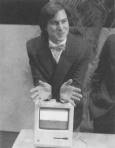I’m not a techie. That’s why I have always relied on Apple. I’ve used nothing but Apple for all the years I have had a computer, and now I’m on my third iMac (and can’t wait for my next one), I use an iPhone and an iPad. The iPad is the best “thing” I have ever owned in my life.
So this is a sad morning for me.

Farhad Manjoo weighs in on Steve Jobs this morning on Slate, after the stunning (though clearly expected) announcement that he is stepping down as CEO. Here is a portion of Manjoo’s article, Who Needs Him? Apple will do amazingly well without Steve Jobs:
I don’t mean to dismiss Jobs’ contributions. He has been as central to Apple’s success as one man has ever been to any firm in the history of business. But Jobs’ achievement wasn’t just to transform Apple from a failing enterprise into a staggeringly successful one. More important was how he turned it around—by remaking it from top to bottom, installing a series of brilliant managers, unbeatable processes, and a few guiding business principles that are now permanently baked into its corporate culture. Apple today operates in the image of Steve Jobs—and it’s going to remain that way long after he’s gone.
Jobs has done something that must be unprecedented in the consumer goods business: He’s turned a luxury brand into a mainstream one while still hanging on to luxury profits.
This last thing—hanging on to profits—is another central tenet of Jobs’ leadership, one that isn’t going go away after he’s gone. Indeed, if you were to sum up Jobs’ entire approach to business in a single pithy line, it would go something like this: Make good stuff. Make it cheap. Sell it for more than you make it.
Here are the three key sentences:
Make good stuff. Make it cheap. Sell it for more than you make it.
Business 101. It reminds me of the way Fried and Hannson put it in Rework:
The truth is every business, new or old, is governed by the same set of market forces and economic rules. Revenue in, expenses out. Turn a profit or wind up gone… Anyone who takes a “we’ll figure out how to profit in the future” attitude to business is being ridiculous. A business without a path to profit isn’t a business, it’s a hobby…
Start an actual business… Act like an actual business and you’ll have a much better shot at succeeding.
But…after acknowledging this, I confess that I am not as optimistic as Mr. Manjoo about the long-term for Apple. I wrote a blog post a while back, comparing Steve Jobs’ insight to that of the fictional (based on the real Anna Wintour) character Miranda Priestly in The Devil Wears Prada: Steve Jobs, The Market Of One – His Opinion Is The Only One That Matters. Quoting from the book Little Bets:
The Steve Jobs factor…The person who makes those decisions …is Jobs. He’s the market – not users. He’s the market of one, in the case of Apple…”
I hope Apple continues to amaze us with astounding new, useful, innovative, game-changing products. But Steve Jobs really is without peer.
——–
The best tweet I read included this:
iSad.
